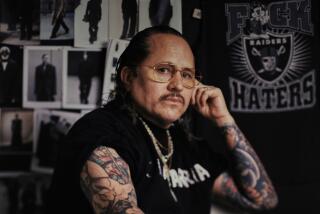Flaunting satire in high style
- Share via
“People watch movies too closely,” laments a character in William Klein’s “Who Are You, Polly Maggoo?” “There should be gaps.”
A wicked satire of the fashion industry, the movie is riddled with lacunas, cutting scenes short only to return to them later, sometimes for as little as a few frames. Klein tries on styles like a designer experimenting with new looks: a little documentary, a touch of farce, perhaps some fantasy.
Like the other movies in Eclipse’s three-film collection, “The Delirious Fictions of William Klein,” out Tuesday, “Polly Maggoo” is a fractured spectacle with an acid heart.
An American GI who moved to France after World War II, Klein fell in with a Left Bank circle that included Chris Marker and Delphine Seyrig, as well as many of the French luminaries who turn up in implausibly small roles in his movies. In 1969’s “Mr. Freedom,” Serge Gainsbourg has a cameo as a radio operator, and Yves Montand plays several scenes as a frozen corpse.
Klein spent 10 years as a photographer for American Vogue, a period during which he also art-directed Louis Malle’s “Zazie dans le metro.” Somewhere between the lunatic carnivals of Richard Lester and the wholesale deconstruction of Jean-Luc Godard, Klein’s movies mix and match with heady abandon, but their carefree surfaces belie their rigorous designs.
Taking his cues from the Situationist practice of detournement, Klein recycles the junk of popular culture as potent explosive. The hero of “Mr. Freedom” is straight out of a jingoist comic book, a broad-shouldered American hero fighting communism abroad and dissidents at home. But he’s also a caricature of the country’s dark side, a muscle-bound racist who’s as much a danger to his friends as his enemies.
The movie is a garish cartoon, as “Mr. Freedom” (John Abbey) fights to save the “mixed-up, sniveling crybabies” of France from the Soviet stand-in Moujik Man (Philippe Noiret) and the even more diabolical Red China Man. But beneath its outlandish satire is a sophisticated critique of the U.S. as a nation that exports the language of democracy without its substance.
“Polly Maggoo,” from 1966, is Klein’s poison-pen letter to the fashion industry, with photographers, journalists and even a dashing prince (Sami Frey) chasing after Dorothy MacGowan’s cover girl. At a fashion show, a Diana Vreeland-ish editor coos over dresses made from sharp-edged sheet metal, while backstage assistants dab on concealer to cover the puncture wounds.
1977’s “The Model Couple” takes aim at social engineering, with a young bourgeois couple (Andre Dussollier and Anemone) volunteering to live under 24-hour surveillance to help fine-tune the city of the future. The movie anticipates the dawn of reality television, but what sets it apart from, and above, Klein’s other movies is the depth of its characters
“The Model Couple” is the least pointed of Klein’s satires, but it’s also the most affecting, because he’s observing from within as well as without. The camera pushes in close, sometimes lopping off the top of its subjects’ heads, so that what’s offered up as spectacle also feels like an invasion.
Perhaps feeling his characters deserved some privacy, Klein abandoned fiction after “The Model Couple.” “Delirious Fictions” feels like an unfinished work, a sentence that ends with an ellipsis instead of a period. But it’s a gap Klein chose not to fill.
More to Read
Only good movies
Get the Indie Focus newsletter, Mark Olsen's weekly guide to the world of cinema.
You may occasionally receive promotional content from the Los Angeles Times.







